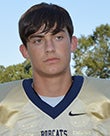Mother: Make safety a priority on football field
Published 10:55 am Tuesday, September 15, 2015
More than 10 days later, 15-year-old Bogue Chitto football player Tucker Lambert is still feeling and discovering the symptoms of a concussion he sustained in a game against Wesson Sept. 4. Seeing the toll it has taken on her son, his mother Clancey Laird Lambert has committed to spreading awareness and promoting education on the dangers of concussions.
Doctors told Tucker on Monday that he can no longer participate in football or any other contact sport. 
Lambert said sports have always come naturally to Tucker, who’s been playing football since age 6. Once Tucker began ninth grade, he became the starting quarterback for the high school team, Lambert said.
“He received his first concussion and I took him to our local ER,” Lambert said. “I honestly didn’t think much about it at the time because concussions were just part of football and many received them. He seemed to progress well shortly afterwards so I didn’t think anything else of it.”
This was in September of 2014. After a hard hit, he was treated by a local neurologist and prescribed a serious of beta-blockers and other medications, Lambert said. He was also prescribed Topamax for treatment of onset migraines brought on by the concussion as well as Imitrex. None of these worked.
His second concussion felt a lot more serious, Lambert said, and afterwards he was told not to participate in any contact sport. She said it took almost nine months to regain his agility and balance, but wasn’t then at 100 percent. Tucker went back and forth from determination to play despite the danger and hanging up his helmet.
A parental release was necessary for him to continue playing.
In the game against Wesson earlier this month, Tucker was taken down.
“When I couldn’t see Tucker’s number on the field, I could always find him because he wore hot pink shoe laces. I saw the laces,” Lambert said. “And he wasn’t moving. I took off running on the field. When I got there, his eyes were fluttering and rolling back in his head. They looked like glazed over grey marbles. He didn’t know where he was, who he was. Couldn’t move his hands or feet. It was the most horrible, helpless feeling I’ve ever experienced. We were transported to UMMC.”
According to the American Academy of Neurology, common symptoms a person may display following a concussion include confusion or feeling dazed, clumsiness, slurred speech, nausea or vomiting, headache, balance problems or dizziness, blurred vision, sensitivity to light, sensitivity to noise, sluggishness, ringing in ears, behavior or personality changes, concentration difficulties and memory loss.
The American Academy of Neurology has issued guidelines about resuming activities after a concussion, and warns of the effects of repeat concussions. Repeat concussions cause cumulative effects on the brain. Successive concussions can have devastating consequences, including brain swelling, permanent brain damage, long-term disabilities or even death.
On Monday, Tucker was taken to the ER at UMMC after complaining of new symptoms. Lambert said doctors wanted to see him right away.
“They told him about several professional athletes who have Parkinson’s Disease, which studies have proven to be a result from multiple concussions and blows to the head,” Lambert said. “They’ve explained that the healthiest, best athletes have trouble raising a fork to their mouth to feed themselves — the residual effects of head injuries. Doctors are keeping him for at least one night. Want to do another CT to make sure a bleed hasn’t occurred.”
“The issues that worry me the most include the effects most don’t see,” Lambert said. “The mood swings. The depression. The outbursts. The pain. And the fact that I walk in his room all throughout the night to make sure he’s still breathing. I also am terrified of the effects it can or will have on him as he grows. His body is still developing and the brain can only take so much.”
Lambert said one of the most dangerous attitudes involved with this issue is that of parents who push their children too hard, and the kids who want to please them — often sacrificing their health or happiness along the way. Lambert said unfortunately she sees parents living through their child’s athletic success, and encourages parents of athletes to truly listen to their kids.
“I am so very proud of my son’s natural athletic ability, but he earned it. Not his dad. Not me. He worked for it,” she said. “But when health issues arise, think of having your child with you for many years to come —leading a healthy, productive future. I’ve said it a million times: I’d rather have my son with me than any Heisman Trophy or championship ring. Chances are, many won’t make it to the SEC or NFL so stop pushing your child to the point [that] they feel failure of disappointing you by not playing.”
“Please listen to and observe your children” Lambert said. “Don’t push them so you can reap the joy and glory of saying ‘Hey that’s my son who scored six TDs.’ Love your children and put them and their health first. […] But most importantly, be responsible and do what’s best for your child. Not for yourself.”
As for Tucker, Lambert said he doesn’t want to play anymore, though he misses it and is sad because he wanted to play college ball.
“He feels he’s let his dad and coach down. He feels he’s let his teammates down. The emotions are up and down,” Lambert said. “But he was just told the bottom line again from the surgeon: Is it worth it to have dementia? To have memory loss? To have speech problems? He said, ‘No sir it’s not.'”
“I feel we are headed in the right direction with a great staff of surgeons and a neurology team to help him get back to where he needs to be,” Lambert said. “And that’s a happy 15-year-old child.”
Concussion safety has become a priority at all levels of athletics. Locally, King’s Daughters Medical Center provides education and training opportunities for coaches to learn more about concussion symptoms. Tucker’s school was recently given the Safe Sports School Award. The award champions safety and recognizes secondary schools that provide safe environments for student athletes.





